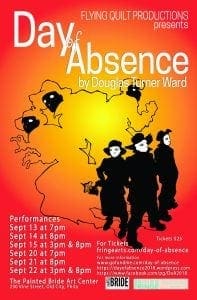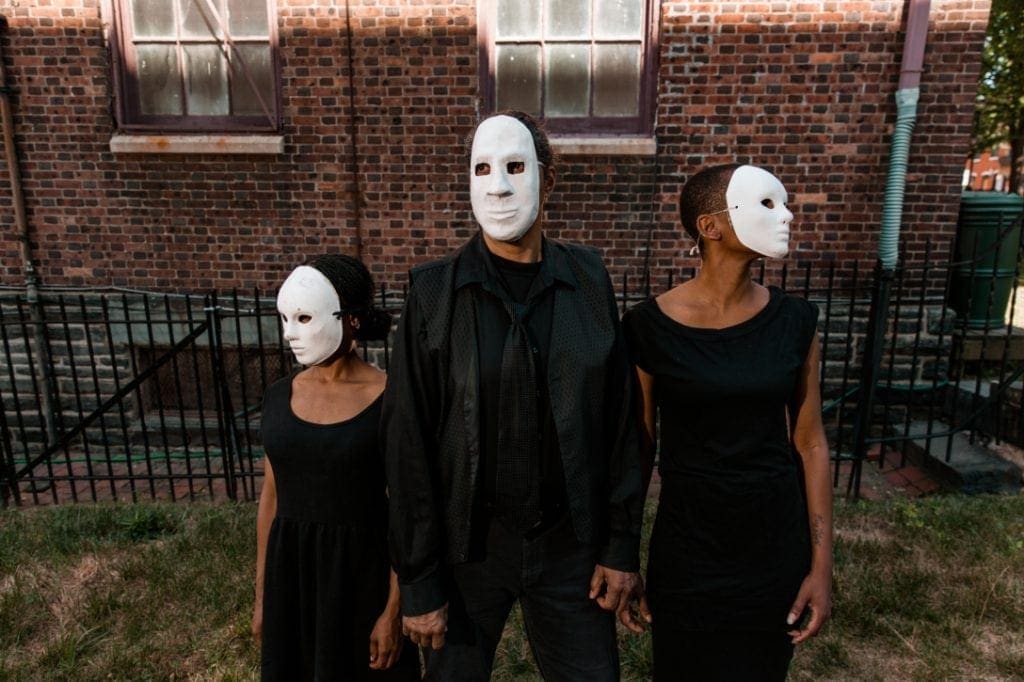Where Have All the Black Actors Gone? To Flying Quilt’s Day of Absence
Opening tomorrow at Painted Bride Arts Center (after two free performances for community groups), the thoughtful comedy Day of Absence explores the dilemma of an unnamed Southern town awakening to find all black folk…gone. Who will tend the children? Who will do the menial work? Who really wears the mask? It’s as relevant today as when Douglas Turner Ward wrote it in 1965.
 The list of actors performing in Flying Quilt Productions’ Fringe show reads like a who’s who of black actors in Philadelphia: Joilet F. Harris, Cathy Simpson, Brian Anthony Wilson, Anthony Cooper, Steve Wright, Nastassja Baset, Rich Bradford, Kim Brown, Carlo Campbell, Niya Colbert, Walter DeShields, Andre N. Jones, Tiffany Bacon, Renee Lucas Wayne, Olivia Wayne, Lenny Daniels, Eric Carter, Chyna Michele, Jack Drummond, and Lary Moten. FringeArts spoke to Moten, artistic director of Flying Quilt, about his impressive cast and contemporarily pertinent play.
The list of actors performing in Flying Quilt Productions’ Fringe show reads like a who’s who of black actors in Philadelphia: Joilet F. Harris, Cathy Simpson, Brian Anthony Wilson, Anthony Cooper, Steve Wright, Nastassja Baset, Rich Bradford, Kim Brown, Carlo Campbell, Niya Colbert, Walter DeShields, Andre N. Jones, Tiffany Bacon, Renee Lucas Wayne, Olivia Wayne, Lenny Daniels, Eric Carter, Chyna Michele, Jack Drummond, and Lary Moten. FringeArts spoke to Moten, artistic director of Flying Quilt, about his impressive cast and contemporarily pertinent play.
FringeArts: What first moved you about Day of Absence?
Lary Moten: When I first read it, I was in college—called Hampton Institute when i attended, now Hampton University—studying theater. It was 1968 and we were studying the plays that exploded from black playwrights during that turbulent time. Day of Absence struck me so much because it’s a comedy. It showed how all of the anger and frustration, analysis and commentary, could be turned into genuine laughter without casually dismissing the underlying causes, facing those issues unflinchingly. It grabbed me then. Unfortunately, it still grabs us now.
FringeArts: Why did you want to bring it to this year’s Fringe?
Lary Moten: There is so much turmoil in the U.S. at this moment—people questioning black lives matter, political, social, cultural and economic upheaval—and Day of Absence speaks directly to those issues. And with lots of laughs. Day of Absence is castor oil smothered in honey. As usual in times like this, the best art rises to the challenge of connecting folks with issues that affect their daily lives concretely. That is why i wanted to see this show mounted. Especially during the Fringe. And at the Painted Bride given their history of community work.
FringeArts: What was the process like for casting and putting this show on?
Lary Moten: This production started with a desire to bring together the best African American actors in this town, many of whom have been underutilized, in a play that speaks to contemporary issues. So I made some calls, made my pitch and everyone I called said yes—often before i could even finish my pitch. Such is the power of this play. So it was left to our director John Doyle, who knew most of the actors personally or by reputation, to slot them into the 27 roles. Financially it’s been a real challenge to say the least. Thousands are needed for the Equity actors and our venue (Painted Bride Art Center) so a GoFundMe campaign, a PayPal button on our website, direct letter appeals and other means have been used to get the word out for financial help. Our rehearsal process has aided in bonding some of the actors who knew each other perhaps but never worked together. It’s been really exhilarating to watch. The future for this particular project? We shall see…..
FringeArts: What was the genesis for Flying Quilt?
Lary Moten: Flying Quilt Productions (FQP) arose from my desire to produce work that challenges audiences. Plays, films, tv, radio plays with social political themes that resonate with the audience. Additionally, FQP is about family and community. FLYING is an homage to my mother’s youngest brother taught prop pilots how to fly jets; QUILT from my father’s mother who created these amazingly intricate works of art we call quilts. So family is the genesis. And community follows. It starts with the Jack and Jill Tom Thumb wedding where i played the groom at age 4 through to my concurrent work with Pugh playwright Ed Shockley as an actor, director and filmmaker Euzhan Palcy (Sugar Cane Alley, A Dry White Season) as her director of development. And the time i spent in Hollyweird as a film and sound editor cemented in me the mandate that as African-American artists we have to create and tell our own stories. We cannot relinquish that power and control to Hollyweird, Broadway, the networks, etc. They have no interest in perpetuating our culture and have time and again abused their power. Theatrical plays will not be the only art coming from FQP and there will be more from FQP in the future. The best way to say it is with my avatar – ???? “Future’s so bright, gotta wear shades.” This is just the beginning….
FringeArts: Do you think Day of Absence will remain relevant in another half-century?
Lary Moten: You know it’s disappointing that it is still relevant today 53 years after it was written. And race relations have seen better days. So if Day of Absence is relevant in the future because 50 years from now our society has not changed that means we as humans have not evolved. i believe evolution is possible. i would like to believe that Day of Absence’s relevance then would be as a historical reflection of what used to be… as opposed to what is.
FringeArts: What else are you looking forward to this Fringe Festival?
Lary Moten: James Ijames’s Kill Move Paradise is a must-see for me. And Kaleidoscope’s For Colored Girls who have considered suicide when the rainbow is enuf. i am very curious about what their take will be on this classic. Simpatico’s 4Solo looks interesting. And of course Iron Age Theatre’s August in the City.
FringeArts: Thanks Lary!
—Christopher Munden
What: Day of Absence
When: September 13-22, 2018
Where: Painted Bride Art Center, 230 Vine Street
Cost: $25
Produced by Flying Quilt Productions
fringearts.com/event/day-of-absence
Featured photo by Josiah and Steph Photography


